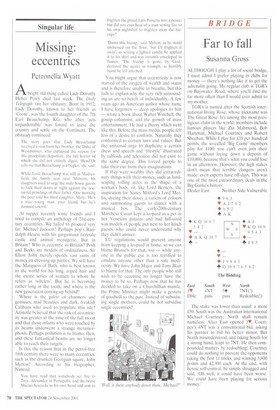Missing: eccentrics
Petronella Wyatt
Abright old thing called Lady Dorothy Heber Percy died last week. The Daily Telegraph ran her obituary. Born in 1912, Lady Dorothy, known to her friends as 'Coote, was the fourth daughter of the 76 Earl Beauchamp, KG, who after 'acts unpardonable' was forced to leave the country and settle on the Continent. The obituary continued:
The story goes that Lady Beauchamp received a visit from her brother, the Duke of Westminster, who explained the reason for this precipitate departure, the full horror of which she did not entirely digest. 'Bend'Or tells me that Beauchamp is a bugler: she said.
While Lord Beauchamp was still at Mathesfield. the family seat near Malvern. his daughters used to urge the male house guests to lock their doors at night against the nocturnal prowlings of their father. One morning the peer told his third daughter, Mary: 'He's a nice young man. your friend, but he's damned uncivil.'
At supper recently some friends and I tried to compile an anthology of 21st-century eccentrics. We failed to proceed very far. Michael Jackson? Perhaps pop's Randolph Hearst with his gargantuan fairytale castle and animal menagerie. But in Britain? Who is eccentric in Britain? Posh and Becks are models of ordinariness. Sir Elton John merely spends vast sums of money on dressing-up parties. We still have the Marquess of Bath, who is best known to the world for his long, roped hair and the exotic series of women to whom he refers as `wifelets'. But he is becoming rather long in the tooth, and where is the new generation coming up behind?
Where is the plea, of charmers and geniuses, mad beauties and dark, freakish Calibans who used to populate this isle? Aristotle believed that the risk of eccentricity was greater at the time of the full moon and that those infants who were touched by its beams underwent a strange metamorphosis. Perhaps pollution is to blame, then, and these fantastical beams are no longer able to reach their targets.
Is this the reason that in the petrol-free 18th century there were so many eccentrics, such as the drunken Georgian squire, John Mytton? According to his biographer, Nimrod:
You have read that somebody set fire to Troy. Alexander to Persepolis. and the brave Mucius Scam)la to his own hand and arm to frighten the proud Lars Porsena into a peace; but did you ever hear of a man setting fire to his own nightshirt to frighten away the hiccups?
'Damn this hiccup: said Mytton, as he stood undressed on the floor. tut LII frighten it away': so seizing a lighted candle he applied it to his shirt and was instantly enveloped in flames. The hiccup is gone, by God: declared the squire in triumph, as horribly burnt he fell into bed.
You might argue that eccentricity is now starved of the oxygen of wealth and status and is therefore unable to breathe, but this fails to explain why the very rich surrounding us are so bereft of individuality. A few years ago an American author whose name I have forgotten — deep apologies to him — wrote a book about Walter Winchell, the gossip columnist, and the growth of mass entertainment. He had a theory which went like this. Before the mass media, people felt less of a desire to conform. Naturally they conformed to certain laws and values. But the universal urge to duplicate a certain dress and speech and 'lifestyle' illustrated by tabloids and television did not exist to the same degree. This forced people to take their cue from their imaginations.
If they were wealthy they did extraordinary things with their money, such as landscaping rolling acres in the shape of a woman's body. or, like Lord Berners, the inspiration for Nancy Mitford's Lord Merlin, dyeing their doves a variety of colours and summoning guests to dinner with a musical box. The early-20th-century Marchesa Casati kept a leopard as a pet in her Venetian palazzo and had full-sized wax models of people put next to her lunch guests, who could never understand why they didn't answer.
EU regulations would prevent anyone from keeping a leopard at home, so we can blame Brussels for that, too — while anyone in the public eye is too terrified to emulate anyone other than a safe mediocrit■.,,. We have John Major and Tony Blair to blame for that. The only people who still wish to be eccentric no longer have the money to be so. Perhaps now that he has decided to take on a Churchillian mantle, the Prime Minister might make a gesture of goodwill to the past. Instead of subsidising single mothers, could he not subsidise single eccentrics?


















































































 Previous page
Previous page